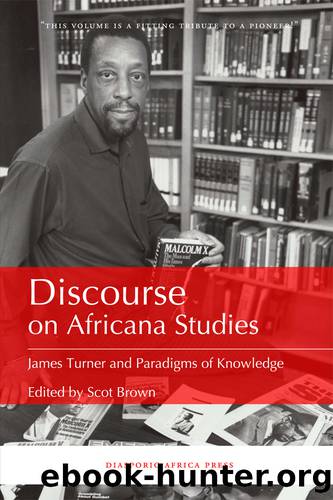Discourse on Africana Studies by Brown Scot;

Author:Brown, Scot;
Language: eng
Format: epub
Publisher: Diasporic Africa Press
Published: 2017-10-26T00:00:00+00:00
Pedagogically and intellectually, Africana philosophy seeks to ârename the worldâ and broaden the knowledge base for all of us through the concept of Afrocentricity in Black studies.
The Black studies proposition at the empirical and conceptual levels relates to fundamental methods of acquiring knowledge and organizing curricula from which we all receive education. In recent years black educators have criticized with growing intensity the limitations in Anglocentric assumptions and, particularly, the notion that there are ultimate or absolute truths derived from universal research. The process of accepting new theories in the academic community is not simply a matter of adopting explanations of experimentally verified empirical observations, but of accepting competing conceptions of reality and dissimilarities of reference language. Moreover, a scientific theory is more likely to be a conceptually relative entity in the sense that the language of one theory may not be translatable into the language of its predecessor in the same field of research. The major propositions characterizing the mainstream of academic research conclude that empirical laws of social regularity should be the basis of predictions; that social scientists should be disinterested, objective observers of social phenomena and their works (value) free of normative content; that all expressions or normative judgments are reducible to emotive expressions and thus of limited theoretical worth or, at least, open to suspect. However, the major disciplines have a primal tendency to reduce all problems of understanding to technical problems of information gathering and gauging variables.
The dominant fields of knowledge thus surreptitiously support the status quo, because the normative judgments germane to its technical procedures, and applications of their findings, are generally ignored and do not face the test of critical examination or empirical verification. Indeed, the normative principles are so ensconced in the conceptual orientation that they are not even recognized as such. For all the contention and support lent by American intellectuals and educators to the possibility of, and need for, value-neutral social theory, the product of the mainstream too often âturns out to be disguised ideology.â This is not necessarily a condemnation; the essential point being made here is summed up in the following proposition: If there are grounds for holding that facts of nature are seen through a paradigmatic scheme, in effect there are grounds for believing social facts are not independent of conceptual paradigms used to investigate them. Dr. Lorenzo Morris is particularly poignant on this point: âWhen social statistics are perceived as meaningful in America, it is because they relate to values in American society. Conversely, when the conditions of Black and White Americansâ¦are compared, no social statistic can be completely neutral unless it is also completely meaningless.â255
The theoreticians of Black studies use the basic social science concept of the sociology of knowledge to explain the legitimacy of the idea that the position of black people in the social structure not only offers peculiar insights, but also represents a specific meaning about social truth. Furthermore, all knowledge is a perspective on shared experience.
A. Olomenji argues, in a manuscript
Download
This site does not store any files on its server. We only index and link to content provided by other sites. Please contact the content providers to delete copyright contents if any and email us, we'll remove relevant links or contents immediately.
| Americas | African Americans |
| Civil War | Colonial Period |
| Immigrants | Revolution & Founding |
| State & Local |
In Cold Blood by Truman Capote(3136)
Steve Jobs by Walter Isaacson(2765)
The Innovators: How a Group of Hackers, Geniuses, and Geeks Created the Digital Revolution by Walter Isaacson(2498)
All the President's Men by Carl Bernstein & Bob Woodward(2263)
Lonely Planet New York City by Lonely Planet(2102)
The Room Where It Happened by John Bolton;(2032)
And the Band Played On by Randy Shilts(2014)
The Murder of Marilyn Monroe by Jay Margolis(1980)
The Poisoner's Handbook by Deborah Blum(1977)
The Innovators by Walter Isaacson(1971)
Lincoln by David Herbert Donald(1869)
A Colony in a Nation by Chris Hayes(1796)
Under the Banner of Heaven: A Story of Violent Faith by Jon Krakauer(1684)
Amelia Earhart by Doris L. Rich(1585)
The Unsettlers by Mark Sundeen(1584)
Birdmen by Lawrence Goldstone(1533)
Dirt by Bill Buford(1519)
Zeitoun by Dave Eggers(1517)
Decision Points by George W. Bush(1463)
